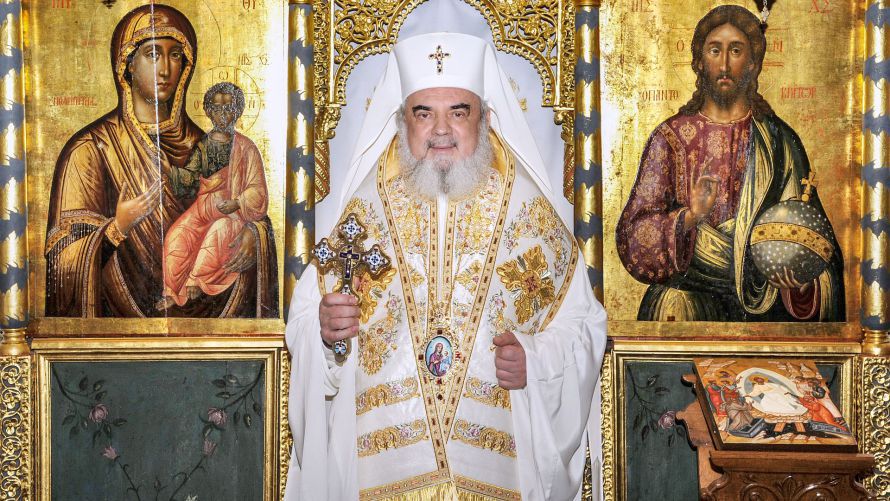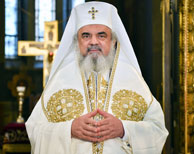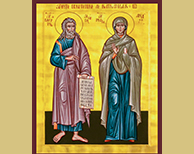The Saviour urges us to pray more, not only in hard times, but also to thank God for all our benefits, His Beatitude Patriarch Daniel said in the sermon delivered in the historical chapel of the Patriarchal Residence.
The Gospel text read on 21 August 2016, on the 9th Sunday after Pentecost, in all the places of worship of the Romanian Patriarchate shows us the Saviour walking on the sea and ceasing the storm (Matthew 14:22-34).
The Patriarch of Romania showed, in the sermon delivered after the Divine Liturgy celebrated in the chapel of Saint Great Martyr George of the Patriarchal Residence, that we overcome the trials of life through faith.
Today’s Gospel text presents us three great teachings: first of all, we see that after multiplying the loaves and fish which fed five thousand men, besides women and children, Jesus prays alone, on the mountain, to God-the-Father, to thank Him and fill His heart of the merciful love of God for humans. Secondly, we see that Jesus lets His disciples fight against the storm on the sea overnight, so that they should understand how badly needed the help of God is when man is in danger. Thirdly, the Gospel text shows us tha, in fact, the ship sailing on the rough sea at night symbolises the Church of Christ fighting against the hostile powers and circumstances of history, His Beatitude said.
We see in the Gospel that after Jesus Christ dismissed the crowds which he had miraculously fed with five loaves and two fish, He did urge His disciples to go to the other side of the sea. Then, he retired to the mountain, alone, to pray and thank God-the-Father for the miracle worked.
We see Jesus retiring in loneliness to pray, and to avoid being praised by the people. Thus, He teaches us that after a success, after a great triumph, we should not expect people to praise us, but first of all retire in prayer to thank God for the help given. We must also keep on praying God to fill, through prayer, the human’s heart with His Merciful love, so that when the one who has received God’s help goes to other people to have the merciful love of God in his heart, His Beatitude Patriarch Daniel emphasised.
His Beatitude Daniel has also shown that Jesus, the Saviour, retires to the mountain because the mountain represents the symbolic relation of the earth with the heaven:
The mountain calls to climbing, on foot, an external climbing, but it also calls to an interior spiritual climbing, to spiritual elevation to God who comes to help the humans. Psalmist David says: “I lift up my eyes to the mountain where does my help come from?”. Namely the mountain represents the meeting of the creation with the Creator. This is why the majority of the Orthodox churches are built on a hill, to urge the people to spiritual elevation through prayer, to rise above the troubles of the world, of every day, in order to unite with God who is the Source of eternal Life and of all gifts and boons.
“We change loneliness into communion with God through prayer”
Thus, this prayer of Jesus is a very important teaching for us, namely that we change loneliness into communion with God through prayer. Today’s man avoids loneliness and feels lonelier and lonelier because he does no longer cultivate his communion with God. One of the Western philosophers of the 20th century spoke about the crowds of the cities who felt lonely because nobody really knew who the one by his side was, calling it the “lonely crowd”. Even when he is alone, the monk is no longer lonely because he prays God very often, so that he is with God, with all the saints and with the entire Church in prayer.
“We must pray not only in hard times, but thank God for all our benefits”
The Saviour urges us, through His example, to pray much not only when we pass through hard times, but also to thank God for all our benefits, His Beatitude has also said, further showing that: prayer is not only the work of man in front of God, but also God’s work present through His grace in the soul of the one who is praying. Prayer is not only man’s activity for God, but also a work of the grace of God present in man which enlightens his mind, warms his heart, and purifies his senses.
Patriarch Daniel has also explained the fact that whenever we are tried by temptations we must keep a living relationship with God not to become frightened:
The Gospel says: “Seeing the strong wind, Peter became frightened”. It does not say “feeling the waves”, by “seeing the wind”, which means that for one moment he did no longer look at Jesus, but at the waves moved by the wind. Thus, the Gospel shows us that in time of trial we must keep the direct relationship with Jesus, to believe in Him and love Him lest we be overwhelmed by the fear of danger.
His Beatitude Patriarch Daniel has also explained the spiritual significance of the physical elements present in the evangelical parable of this Sunday:
The Gospel text of the day also shows us that the power by which Jesus walked on the water and ceased the storm and the rough see was a divine one. The ship has often been interpreted as a symbol of the Church tried by the waves of history, by persecutions, heresies, and by the dark forces hostile to her. The wind blowing against the ship represents the times or circumstances in which the Church comes across hostility and rejection in her sanctifying work. The ship in the Gospel text of the day also represents the Church in a rough world full of sins and selfish, individual or collective passions. This Gospel also shows us how the Christian soul must fight in time of trial. Some of the Holy Fathers considered the fight of the disciples against the rough waves of the sea at night as a fight of the soul against temptations. They have seen that man cannot get rid of passions unless he always prayed for Jesus’ help. This is why the fathers of the wilderness and then all monasteries practiced the heart’s prayer: “Lord Jesus Christ, Son of God, have mercy on me, the sinner!”.
The Gospel text of the day calls to strengthrn in faith, to grow in prayer, as well as in the hope that if we call for the help of Jesus He comes and helps us and we feel the joy that the disciples felt at the time of the storm on the sea, the Patriarch of Romania concluded.
Then, His Beatitude read the message addressed to the migrant Romanians.According to the Decision of the Holy Synod of the Romanian Orthodox Church (25 – 26 February 2009), on the first Sunday after the feast of theFalling Asleep of the Mother of God, the Sunday of the Migrant Romanians is celebrated showing the appreciation and spiritual care of the hierarchs of the Romanian Orthodox Church for the spiritual sons and daughters gone outside the frontiers of the country for various reasons.

Patriarch of Romania: „Firm faith in Jesus Christ overcomes the hard trials”

The Saviour urges us to pray more, not only in hard times, but also to thank God for all our benefits, His Beatitude Patriarch Daniel said in the sermon delivered in the historical chapel of the Patriarchal Residence.
The Gospel text read on 21 August 2016, on the 9th Sunday after Pentecost, in all the places of worship of the Romanian Patriarchate shows us the Saviour walking on the sea and ceasing the storm (Matthew 14:22-34).
The Patriarch of Romania showed, in the sermon delivered after the Divine Liturgy celebrated in the chapel of Saint Great Martyr George of the Patriarchal Residence, that we overcome the trials of life through faith.
Today’s Gospel text presents us three great teachings: first of all, we see that after multiplying the loaves and fish which fed five thousand men, besides women and children, Jesus prays alone, on the mountain, to God-the-Father, to thank Him and fill His heart of the merciful love of God for humans. Secondly, we see that Jesus lets His disciples fight against the storm on the sea overnight, so that they should understand how badly needed the help of God is when man is in danger. Thirdly, the Gospel text shows us tha, in fact, the ship sailing on the rough sea at night symbolises the Church of Christ fighting against the hostile powers and circumstances of history, His Beatitude said.
We see in the Gospel that after Jesus Christ dismissed the crowds which he had miraculously fed with five loaves and two fish, He did urge His disciples to go to the other side of the sea. Then, he retired to the mountain, alone, to pray and thank God-the-Father for the miracle worked.
We see Jesus retiring in loneliness to pray, and to avoid being praised by the people. Thus, He teaches us that after a success, after a great triumph, we should not expect people to praise us, but first of all retire in prayer to thank God for the help given. We must also keep on praying God to fill, through prayer, the human’s heart with His Merciful love, so that when the one who has received God’s help goes to other people to have the merciful love of God in his heart, His Beatitude Patriarch Daniel emphasised.
His Beatitude Daniel has also shown that Jesus, the Saviour, retires to the mountain because the mountain represents the symbolic relation of the earth with the heaven:
The mountain calls to climbing, on foot, an external climbing, but it also calls to an interior spiritual climbing, to spiritual elevation to God who comes to help the humans. Psalmist David says: “I lift up my eyes to the mountain where does my help come from?”. Namely the mountain represents the meeting of the creation with the Creator. This is why the majority of the Orthodox churches are built on a hill, to urge the people to spiritual elevation through prayer, to rise above the troubles of the world, of every day, in order to unite with God who is the Source of eternal Life and of all gifts and boons.
“We change loneliness into communion with God through prayer”
Thus, this prayer of Jesus is a very important teaching for us, namely that we change loneliness into communion with God through prayer. Today’s man avoids loneliness and feels lonelier and lonelier because he does no longer cultivate his communion with God. One of the Western philosophers of the 20th century spoke about the crowds of the cities who felt lonely because nobody really knew who the one by his side was, calling it the “lonely crowd”. Even when he is alone, the monk is no longer lonely because he prays God very often, so that he is with God, with all the saints and with the entire Church in prayer.
“We must pray not only in hard times, but thank God for all our benefits”
The Saviour urges us, through His example, to pray much not only when we pass through hard times, but also to thank God for all our benefits, His Beatitude has also said, further showing that: prayer is not only the work of man in front of God, but also God’s work present through His grace in the soul of the one who is praying. Prayer is not only man’s activity for God, but also a work of the grace of God present in man which enlightens his mind, warms his heart, and purifies his senses.
Patriarch Daniel has also explained the fact that whenever we are tried by temptations we must keep a living relationship with God not to become frightened:
The Gospel says: “Seeing the strong wind, Peter became frightened”. It does not say “feeling the waves”, by “seeing the wind”, which means that for one moment he did no longer look at Jesus, but at the waves moved by the wind. Thus, the Gospel shows us that in time of trial we must keep the direct relationship with Jesus, to believe in Him and love Him lest we be overwhelmed by the fear of danger.
His Beatitude Patriarch Daniel has also explained the spiritual significance of the physical elements present in the evangelical parable of this Sunday:
The Gospel text of the day also shows us that the power by which Jesus walked on the water and ceased the storm and the rough see was a divine one. The ship has often been interpreted as a symbol of the Church tried by the waves of history, by persecutions, heresies, and by the dark forces hostile to her. The wind blowing against the ship represents the times or circumstances in which the Church comes across hostility and rejection in her sanctifying work. The ship in the Gospel text of the day also represents the Church in a rough world full of sins and selfish, individual or collective passions. This Gospel also shows us how the Christian soul must fight in time of trial. Some of the Holy Fathers considered the fight of the disciples against the rough waves of the sea at night as a fight of the soul against temptations. They have seen that man cannot get rid of passions unless he always prayed for Jesus’ help. This is why the fathers of the wilderness and then all monasteries practiced the heart’s prayer: “Lord Jesus Christ, Son of God, have mercy on me, the sinner!”.
The Gospel text of the day calls to strengthrn in faith, to grow in prayer, as well as in the hope that if we call for the help of Jesus He comes and helps us and we feel the joy that the disciples felt at the time of the storm on the sea, the Patriarch of Romania concluded.
Then, His Beatitude read the message addressed to the migrant Romanians.According to the Decision of the Holy Synod of the Romanian Orthodox Church (25 – 26 February 2009), on the first Sunday after the feast of theFalling Asleep of the Mother of God, the Sunday of the Migrant Romanians is celebrated showing the appreciation and spiritual care of the hierarchs of the Romanian Orthodox Church for the spiritual sons and daughters gone outside the frontiers of the country for various reasons.

















